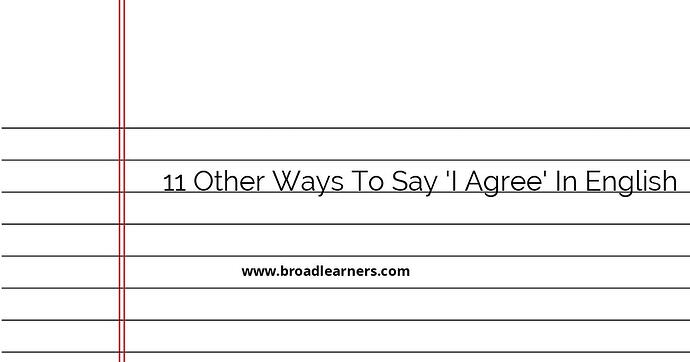When you want to express agreement with someone in English, there are many phrases you can use instead of simply saying 'I agree'. Each of these alternative phrases adds variety and depth to your conversations. Here are 11 other ways to say 'I agree':
- I concur.
- I completely agree.
- I share the same opinion.
- That's exactly my view.
- I couldn't agree more.
- Absolutely!
- Definitely!
- Without a doubt.
- Agreed!
- You're right.
- I'm with you on that.
Using these phrases not only shows your agreement, but it also demonstrates your ability to communicate effectively and engage in meaningful conversations. Let's explore each alternative phrase with examples:
1. I concur.
When you say 'I concur', you are expressing complete agreement. This phrase is typically used in formal or professional settings. It shows that you not only agree, but also understand and support the other person's point of view.
Example:
Colleague: 'I think we should implement this new strategy.'
You: 'I concur. I believe it will greatly benefit our company.'
2. I completely agree.
'I completely agree' is a straightforward way to show your full agreement with someone's statement or opinion. This phrase is commonly used in both formal and informal contexts.
Example:
Friend: 'The movie was fantastic!'
You: 'I completely agree. It was amazing!'
3. I share the same opinion.
By saying 'I share the same opinion', you are indicating that you have the same viewpoint as the other person. This phrase is suitable for expressing agreement in both personal and professional conversations.
Example:
Colleague: 'I believe this project requires more research.'
You: 'I share the same opinion. We need to gather more data before making any decisions.'
4. That's exactly my view.
'That's exactly my view' is a strong statement of agreement. It implies that your perspective aligns precisely with the other person's. This phrase is best used when you want to emphasize your complete agreement.
Example:
Friend: 'I think customer satisfaction should be our top priority.'
You: 'That's exactly my view. We need to prioritize customer happiness above everything else.'
5. I couldn't agree more.
'I couldn't agree more' is an expression used to emphasize your strong agreement. It conveys the idea that you agree wholeheartedly and there is no room for disagreement.
Example:
Colleague: 'This new policy will streamline our work processes.'
You: 'I couldn't agree more. It will definitely enhance our efficiency.'
6. Absolutely!
When you respond with 'Absolutely!', you are showing full agreement and enthusiasm. This phrase is commonly used in informal conversations and can convey excitement about the topic being discussed.
Example:
Friend: 'Let's go see that new movie!'
You: 'Absolutely! I've been wanting to watch it.'
7. Definitely!
'Definitely!' is another way to express strong agreement with someone's statement or suggestion. It is a more casual alternative to 'I agree' and can be used in various contexts.
Example:
Colleague: 'We should hire more staff to handle the workload.'
You: 'Definitely! It's necessary to meet the increasing demands.'
8. Without a doubt.
When you say 'Without a doubt', you are affirming your complete agreement. This phrase indicates that there is no uncertainty or hesitation in your agreement.
Example:
Friend: 'The decision to invest in this project is crucial.'
You: 'Without a doubt. It's a great opportunity for growth.'
9. Agreed!
'Agreed!' is a simple and concise way to show your agreement. It is a more informal alternative to 'I agree' but still conveys the same meaning.
Example:
Colleague: 'Let's proceed with the plan as discussed.'
You: 'Agreed! We're on the right track.'
10. You're right.
'You're right' is a phrase that acknowledges the accuracy or correctness of someone's statement. It signifies your agreement and validates the other person's viewpoint.
Example:
Friend: 'We should prioritize quality over quantity.'
You: 'You're right. Quality is crucial for customer satisfaction.'
11. I'm with you on that.
'I'm with you on that' shows solidarity and agreement with the other person's opinion or decision. It implies that you are aligned and supportive of their perspective.
Example:
Colleague: 'I think it's time for a change in our marketing strategy.'
You: 'I'm with you on that. Let's explore new approaches.'
By using these alternative phrases, you can enhance your communication skills and engage in more interesting and meaningful conversations. Remember to choose the phrase that best suits the context and level of formality. Practice incorporating these expressions into your interactions to become a more effective communicator.
Did I miss anything? Respond below
